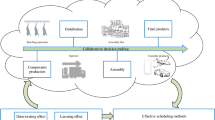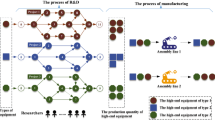Abstract
The increase in human resource cost puts forward higher requirements for the optimization of home appliance manufacturing processes. This paper studied an integrated human resource optimization problem considering the human resource selection, learning effect, skills degradation effect, and parallel production lines. There are multiple different manufacturing tasks with different normal processing times. Human resources have different abilities and costs. The actual processing time of a task is determined by its normal processing time, position, and ability of the human resource. The objective is to minimize production time and the labor cost. To solve the studied problem, we first consider the case where the human resources have been selected and assigned to the production lines. Then, some structural properties are proposed and a heuristic is developed to arrange tasks on every single production line. Also, we derive a lower bound for the problem. Since the investigated problem is NP-hard, a Variable Neighborhood Search is designed to solve the problem in a reasonable time. Finally, computational experiments are conducted and the experimental results validate the performance of the proposed methods.






Similar content being viewed by others
References
Abu-Marrul V, Martinelli R, Hamacher S, Gribkovskaia I (2020) Matheuristics for a parallel machine scheduling problem with non-anticipatory family setup times: application in the offshore oil and gas industry. Comput Oper Res 128:105162
Chen H, Zhao Y, Ji Y, Wang S, Ge W, Su A (2019) Optimization location selection analysis of energy storage unit in energy internet system based on tabu search. Int J Softw Eng Knowl Eng 29(7):941–954
Cheng T, Wang G (2000) Single machine scheduling with learning effect considerations. Ann Oper Res 98(1–4):273–290
Coffman EG, Garey MR, Johnson DS (1978) An application of bin-packing to multiprocessor scheduling. SIAM J Comput 7(1):1–17
Costa A, Fernandez-Viagas V, Framinan JM (2020) Solving the hybrid flow shop scheduling problem with limited human resource constraint. Comput Ind Eng. https://doi.org/10.1016/j.cie.2020.106545
Ding S, Chen C, Zhang Q, Xin B, Pardalos PM (2021) Metaheuristics for resource deployment under uncertainty in complex systems. CRC Press, Boca Raton
Gharehgozli AH, Tavakkoli-Moghaddam R, Zaerpour N (2009) A fuzzy-mixed-integer goal programming model for a parallel-machine scheduling problem with sequence-dependent setup times and release dates. Pergamon Press, Inc., Oxford
Golden BL, Skiscim CC (2010) Using simulated annealing to solve routing and location problems. Nav Res Logist Q 33(2):261–279
Graham RL, Lawler EL, Lenstra JK, Kan AHGR (1979) Optimization and approximation in deterministic sequencing and scheduling: a survey. Ann Discrete Math 5(1):287–326
Guo Y, Ji J, Ji J, Gong D, Cheng J, Shen X (2019) Firework-based software project scheduling method considering the learning and forgetting effect. Soft Comput 23(13):5019–5034
Hardy GH, Littlewood JE, Polya G (1967) Inequalities. Cambridge University Press, London
Hemmelmayr VC, Doerner KF, Hartl RF (2009) A variable neighborhood search heuristic for periodic routing problems. Eur J Oper Res 195(3):791–802
Jin P, Liu B (2004) Parallel machine scheduling models with fuzzy processing times. Inf Sci 166(1–4):49–66
Kong M, Xu J, Zhang T, Lu S, Fang C, Mladenovic N (2021) Energy-efficient rescheduling with time-of-use energy cost: application of variable neighborhood search algorithm. Comput Ind Eng 156:107286
Kurniawan D, Raja AC, Suprayogi S, Halim AH (2020) A flow shop batch scheduling and operator assignment model with time-changing effects of learning and forgetting to minimize total actual flow time. J Ind Eng Manag 13(3):546
Li X, Jiang Y, Ruiz R (2018) Methods for scheduling problems considering experience, learning, and forgetting effects. IEEE Trans Syst Man Cybern Syst PP(99):1–12
Lu S, Liu X, Pei J, Thai MT, Pardalos PM (2018) A hybrid ABC-TS algorithm for the unrelated parallel-batching machines scheduling problem with deteriorating jobs and maintenance activity. Appl Soft Comput 66:168–182
Mladenovic N, Hansen P (1997) Variable neighborhood search. Comput Oper Res 24(11):1097–1100
Mosheiov G (2001) Scheduling problems with a learning effect. Eur J Oper Res 132(3):687–693
Mutu S, Eren T (2020) The single machine scheduling problem with setup times under an extension of the general learning and forgetting effects. Optim Lett 15:1–17
Ranjbar M, Saber RG (2021) A variable neighborhood search algorithm for transshipment scheduling of multi products at a single station. Appl Soft Comput J 98:106736
Roeva O, Zoteva D, Castillo O (2021) Joint set-up of parameters in genetic algorithms and the artificial bee colony algorithm: an approach for cultivation process modelling. Soft Comput 25(3):2015–2038
Taghi M, Javanshir H, Roueintan MA, Soleimany E (2011) Multi-objective group scheduling with learning effect in the cellular manufacturing system. Int J Ind Eng Comput 2(3):617–630
Wang JB, Wang JJ (2013) Scheduling tasks with a general learning effect model. Appl Math Model 37(4):2364–2373
Wright TP (1936) Factors affecting the cost of airplanes. J Aeronaut Sci 3(4):122–128
Yang WH, Chand S (2008) Learning and forgetting effects on a group scheduling problem. Eur J Oper Res 187(3):1033–1044
Zhao C, Min J, Tang H (2011) Parallel-machine scheduling with an availability constraint. Comput Ind Eng 61(3):778–781
Zuo Z, Li Y, Fu J, Wu J (2019) Human resource scheduling model and algorithm with time windows and multi-skill constraints. Mathematics 7(7):598
Author information
Authors and Affiliations
Corresponding author
Additional information
Publisher's Note
Springer Nature remains neutral with regard to jurisdictional claims in published maps and institutional affiliations.
Rights and permissions
About this article
Cite this article
Ji, X., Liao, B. & Yang, S. A variable neighborhood search algorithm for human resource selection and optimization problem in the home appliance manufacturing industry. J Comb Optim 44, 223–241 (2022). https://doi.org/10.1007/s10878-021-00809-y
Accepted:
Published:
Issue Date:
DOI: https://doi.org/10.1007/s10878-021-00809-y




